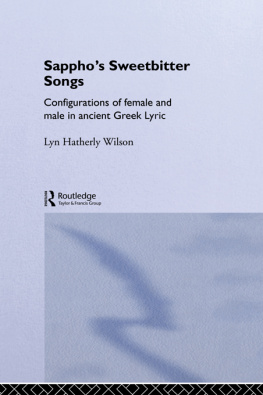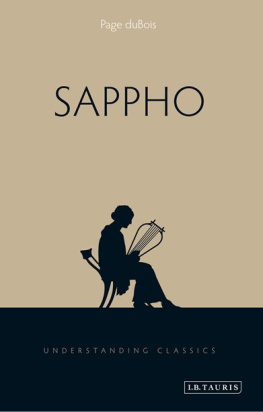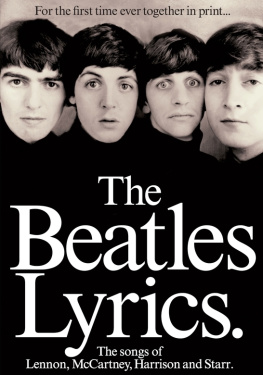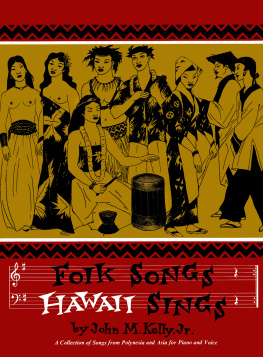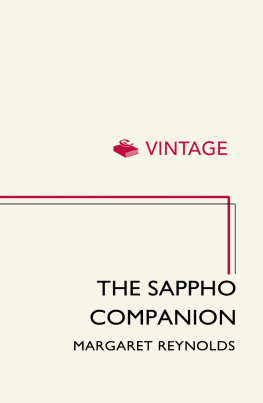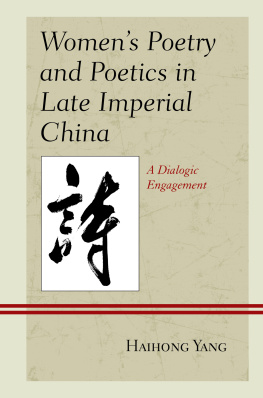Sapphos Sweetbitter Songs
To me he seems as fortunate as the gods / this man, who sits opposite you / so close, listening to the sweet sound / of your voice / and your lovely laughter For when I gaze at you, just for a moment / I can no longer speak / for my tongue has snapped, straightaway / a subtle fire runs beneath my flesh.
The woman-made world described in Sapphos songs has been discussed and analysed for centuries. In her poetry the love of women for other women is lauded, and hymns are sung and pleas addressed to female gods.
The world of Sapphos lyrics at times seems to envisage the dreams of later women. In Sapphos Sweetbitter Songs, late twentieth-century theories of feminism, psychoanalysis and literary criticism are applied to Sapphos lyrics for the first time. The study re-creates and examines a voice that sings of the dreams and interactions of women, that tells of the bodies, rhythms and desires of the women of Sapphos circle. At the same time it offers an analysis of sexual difference, comparing the homoerotic lyrics of male poets of that era to those of Sappho.
Lyn Hatherly Wilson has taught Classics at Monash University, Australia. She now lectures in English at James Cook University. She also writes and edits poetry.
Sapphos Sweetbitter Songs
Configurations of female and male in ancient Greek Lyric
Lyn Hatherly Wilson
First published 1996
by Routledge
2 Park Square, Milton Park, Abingdon, Oxon, OX14 4RN
Simultaneously published in the USA and Canada
by Routledge
270 Madison Ave, New York NY 10016
Transferred to Digital Printing 2005
Routledge is an International Publishing company
1996 Lyn Hatherly Wilson
Typeset in Sabon by
Florencetype Ltd, Stoodleigh, Devon
The author asserts the moral right to be identified as the author of this work. All rights reserved. No part of this book may be reprinted or reproduced or utilised in any form or by any electronic, mechanical, or other means, now known or hereafter invented, including photocopying and recording, or in any information storage or retrieval system, without permission in writing from the publishers.
British Library Cataloguing in Publication Data
A catalogue record for this book is available from the British Library
Library of Congress Cataloguing in Publication Data
Wilson, Lyn Hatherly, 1945-
Sapphos sweetbitter songs: configurations of female and male in ancient Greek lyric / Lyn Hatherly Wilson.
p. cm.
Includes bibliographical references and index.
1. Sappho-Criticism and interpretation. 2. Psychoanalysis and literature-Greece. 3. Feminism and literature-Greece. 4. Gender identity in literature. 5. Women and literature-Greece. 6. Authorship-Sex differences. 7. Sex role in literature.
I. Title.
PA4409.W54 1996
884.01-dc20
9537772
CIP
ISBN 0415126703 (hbk)
ISBN 0415126711 (pbk)
To my companions, my mother, sister, daughters, and the friends who encircle me with support and love.
Contents
Acknowledgements
I would like to acknowledge, with gratitude, the excellent advice given to me by Gerald Fitzgerald, Susan MacAlister and Peter Toohey. Special thanks also to Kerin Barry, Paula Carr, Joanne Gower, and Greg Gardiner, for the valuable time and expertise they contributed towards this project. And to my father, Will Hatherly, for his continued support. To J. J. Winkler, I offer thanks, posthumously, for the inspiration I received from his work on Sappho.
Introduction
More than two and a half millennia ago, a woman, Sappho of Lesbos, composed and sang songs telling of the prayers and rites, the eroticism and the dreams of women. The lyric songs she composed were well-crafted and emotionally evocative, sufficiently so to ensure their preservation through the centuries, and Sapphos renown throughout much of the ancient world. The world she inhabited, or at least the world represented in her songs, was a community of women, a musically oriented environment that appears detached, separate from public arenas. She was one of the first women authors of recorded western culture and her songs tell of the worship of female gods and the idealisation of beauty and erotic love. Fragmentary as these songs now are, they appear to have been constructed in a manner that was woman-centred, to give expression to a womans desires and specificity. One of my desires is to map this woman-made world, to engage in an analysis of the imagistic and symbolic constructs contained within a distinctive poetic territory. In the process I would like to direct my/your gaze at another, more positive view of womankind, a counterbalance to offset the negative images that prevail in later western culture.
My investigation centres on sexual difference. It features a comparison of Sapphos songs or poems Rather than proceeding in a way that could, as Rhode (1984: 6) suggests, inevitably, if inadvertently, flatten analysis, I hope that the comparative processes engaged upon, the questions raised by/in this work will in fact expand the range of enquiry. The intersection of a unique site of difference the world of Sappho of Lesbos with the proliferation of theories, on sex/gender difference and discourse, currently engaging a late twentieth-century western culture, is opportune and exciting. The period focused on, the seventh to fifth century BC and the place, ancient Greece, present a distinctive set of cultural characteristics, eminently suitable for an analysis of poetic representation and difference. Socially, linguistically, intellectually and artistically, the developments which took place during this period were dynamic and intriguing. I believe that in this differently divided context a socio-cultural environment oriented towards oral rather than literate texts there was space for the co-existence of two separate but interactive lyric traditions, one concerned with the desires and pre-occupations of women, another that was configured in relation to the predilections of men. This was a poetically oriented environment which initiated the first written lyrics of our culture and continued through the divergent strains of an extraordinary tradition.
In the course of my discussion, I look to the theories of women who are reconceptualising female specificity in the late twentieth century in Europe to elucidate Sapphos songs. Images of circles: of women, of singers, of songs, of recurring love, resonate through this analysis of a womans voice and constructs. To these circles I would add another circle, one that unites Sapphos circle, or at least her songs about the circle, with women now. Although I am all too aware of the unfathomable interstice that separates then from now, of the bulk of patriarchy dividing Sapphos world from the desires of later women, I dream of two time/spaces in western culture where women could formulate a woman-centred framework.
There are problems which attend every attempted analysis of ancient literature, particularly archaic manuscripts such as those of Sappho of Lesbos. One difficulty is the fragmentary state of the papyri, and the knowledge that although the collection we possess is slowly increasing, it comprises a small and not necessarily representative selection of a once munificent tradition. Parker (1993: 311) calls the text of Sappho a palimpsest, a precious collection of songs and fragments thickly overwritten with the comments of scholarly generations, in which the language is difficult, the society obscure. The records that told of Sapphos existence, that attested perhaps to some individual and discursive coherence, sometime in that other space called ancient Greece, are also in tatters. All we have are reports of statuary, coins and renown, the gossipy bits of news and/or legend provided by later, but relatively antique, commentators. And, of course, the information contained in her songs. These lyrical fragments have provided a fruitful basis for a great number of analyses of a historical, sociological and/or literary nature. To resurrect Sapphos life and her social context on the basis of her fragmentary songs has been the method employed by a time-honoured tradition of scholarship which assumed that some exact and referential interface could be posited between a womans life and her artistic constructions. The personal (I/you) voices that sing out of ancient lyrics encourage such ventures, and the positing of relationships and realities which extend beyond the interactions implied in fragile texts that were/are essentially poetic. The links between the world re-constructed in Sapphos lyrics and some non-discursive reality, however, are necessarily destabilised and arbitrary. Parker (1993: 309) states that we know nothing about Sappho. Taking into consideration the culturally specific and poetically oriented nature of songs which were constructed not for the transmission of biographical details but within the conventions of a particular genre, it seems that we must rely upon hypothesis the suggestions of others and our own surmises -when discussing the life of Sappho.

